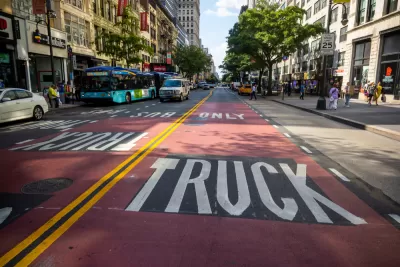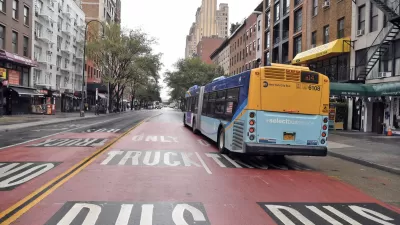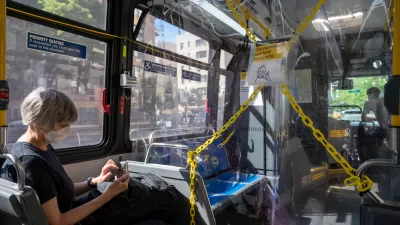An ambitious program to add 20 miles of bus lanes and protected bus ways in the city of New York has been diminished by political opposition in parts of the city.

The New York City Department of Transportation has bowed to Staten Island car owners who objected to a bus lane project, reports Gersh Kuntzman.
The scaled back proposal originally called for dedicated bus lanes in both directions on a 3.3-mile stretch of Hylan Boulevard, according to Kuntzman. "Instead of bus lanes on both side of Hylan between Lincoln and Nelson avenues, the plan now calls for a 1.4-mile bus lane on the south side of Hylan, between Lincoln and Guyon avenues."
Kuntzman notes that the scaled back version of the Staten Island bus lane project is "the second high-profile pullback from a supposed commitment to help long-suffering transit riders in as many weeks." The first: a car-free .3-mile stretch in Flushing that has been suspended indefinitely "after Council Member Peter Koo claimed, in racially supercharged language, that the busway would hurt local businesses, explains Kuntzman. Kuntzman makes sure to point out that the idea that bus lanes hurt local businesses is a myth, "dispelled by DOT’s own statistics."
Councilmembers Steven Matteo and Joe Borelli of Staten Island were responsible for the revised plan for the Hylan Boulevard in Staten Island, according to Kuntzman, who cites an article by the Staten Island Advance for the original news about this particular bus project's demise.
In June, Mayor Bill de Blasio announced plans to roll out an ambitious program of new bus lanes and protected busways around the city to assist transit riders during and after the pandemic, but as reported recently, much of that promise has stalled or, as in the case of these two projects, been scaled back or suspended entirely.
FULL STORY: ANOTHER TRANSIT DEBACLE: DOT Guts Its Own Bus Lane Project

Alabama: Trump Terminates Settlements for Black Communities Harmed By Raw Sewage
Trump deemed the landmark civil rights agreement “illegal DEI and environmental justice policy.”

Study: Maui’s Plan to Convert Vacation Rentals to Long-Term Housing Could Cause Nearly $1 Billion Economic Loss
The plan would reduce visitor accommodation by 25% resulting in 1,900 jobs lost.

Planetizen Federal Action Tracker
A weekly monitor of how Trump’s orders and actions are impacting planners and planning in America.

Waymo Gets Permission to Map SF’s Market Street
If allowed to operate on the traffic-restricted street, Waymo’s autonomous taxis would have a leg up over ride-hailing competitors — and counter the city’s efforts to grow bike and pedestrian on the thoroughfare.

Parklet Symposium Highlights the Success of Shared Spaces
Parklets got a boost during the Covid-19 pandemic, when the concept was translated to outdoor dining programs that offered restaurants a lifeline during the shutdown.

Federal Homelessness Agency Places Entire Staff on Leave
The U.S. Interagency Council on Homelessness is the only federal agency dedicated to preventing and ending homelessness.
Urban Design for Planners 1: Software Tools
This six-course series explores essential urban design concepts using open source software and equips planners with the tools they need to participate fully in the urban design process.
Planning for Universal Design
Learn the tools for implementing Universal Design in planning regulations.
Caltrans
Smith Gee Studio
Institute for Housing and Urban Development Studies (IHS)
City of Grandview
Harvard GSD Executive Education
Toledo-Lucas County Plan Commissions
Salt Lake City
NYU Wagner Graduate School of Public Service




























